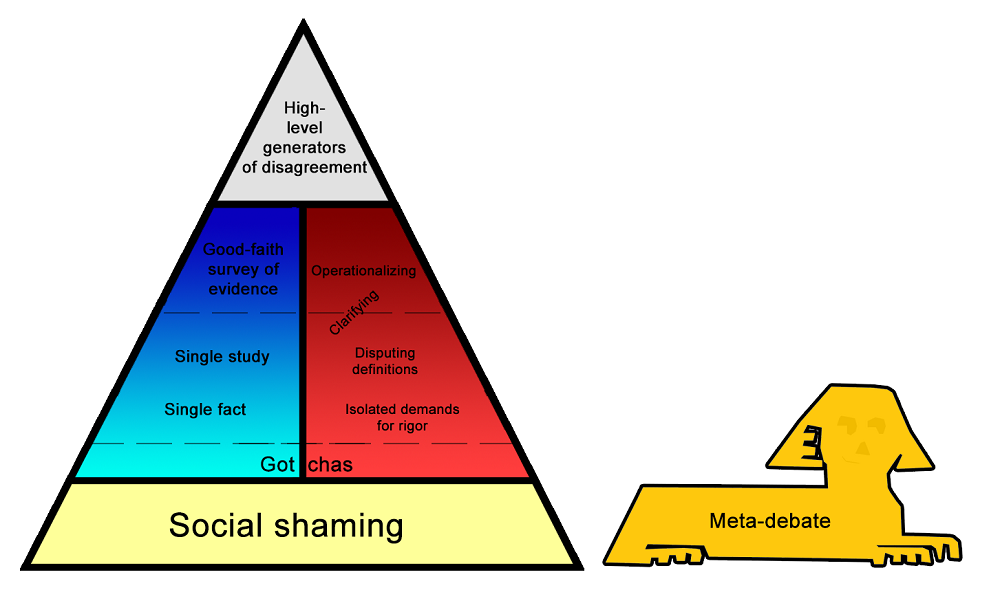LWMap/Varieties of Argumentation Experience
08 Mar 2022 - 13 Nov 2022
- A review of the original post by Scott Alexander
- This seems closely related to Scott's earlier works on conflict theory, which inspired me to write a couple of long blog posts. Scott's a powerful and subtle thinker, and it was an interesting exercise trying to figure out just where he goes wrong; where I find myself pulling in a different direction.
- The common thread of these essays is the nature of disagreement in an abstract sense.
- What motivates conflict?
- What is the relationship between disagreements of fact, opinion, and social status?
- How does morality fit in?
- Why is there so much conflict when smart, well-intentioned people should converge on a single shared truth?
- It boils down to a very fundamental philosophical point about the relationship of truth and power. Scott, a canonical rationalist, wants disagreements to be about matters of fact – true or false statements about the word, and not about social power or legitimacy or anything like that. That feels like it deserves a long essay of its own, but for now I'll outsource to Bruno Latour (see Bruno Latour).
- Scott's essay lays out a bunch of argument techniques, ranked from most lofty to the very lowest form, "social shaming", the preferred tactic of the despised Social Justice Warriors (SJWs).
- The author's position seems to be that it is wrong to make people feel social costs for their opinions, or at least, that it is very poor intellectual form to use tactics like that:
Social shaming also isn’t an argument. It’s a demand for listeners to place someone outside the boundary of people who deserve to be heard; to classify them as so repugnant that arguing with them is only dignifying them.
Nobody expects this to convince anyone. That’s why I don’t like the term “ad hominem”, which implies that shamers are idiots who are too stupid to realize that calling someone names doesn’t refute their point. That’s not the problem. People who use this strategy know exactly what they’re doing and are often quite successful. The goal is not to convince their opponents, or even to hurt their opponent’s feelings, but to demonstrate social norms to bystanders.
the point is that the active ingredient isn’t persuasiveness, it’s the ability to make some people feel like they’re suffering social costs for their opinion.
- I have very mixed feelings about this. Social shaming has, in fact, been a very successful tool in the progressive toolkit. It is undoubtably true that open expressions of racism, sexism, and related biases are much less socially acceptable than they were a few decades ago. It's hard to see this as a bad thing, but it does involve a good bit of social shaming, and if you dig around the darker corners of the internet you will find plenty of people seething at the mind control they are being subjected to.
- These people are vile and deserve to be shamed, but they and the defenders of their right to speak have a point. It's a bit scary that a stray incorrect thought can get one in serious, career-ending trouble these days. Especially since the boundaries of the acceptable are not fixed but are still in play. Also especially since everyone has plenty of built-in racial and sexual biases. Good people try to correct for this, but it isn't easy. And it's also the case that nerds (rationalists, me, and probably you) are less than nimble when it comes to adapting to new social routines and more likely to find themselves in trouble for violating some new norm that they didn't pick up on.
- And the Rationalist part of me really does buy into the rather quaint liberal notion of free speech – that it is important for even foul and harmful ideas to get their airing, that there should be a sphere of speech where anything goes, strictly demarcated from the world of power and consequences. I grew up right next to Skokie, where the ACLU defended the rights of Nazis to march through the largely Jewish community, and I remember admiring how they put their unwavering dedication to an abstract principle ahead of personal distaste.
- I don't think I personally am such a free speech absolutist any more. I can't see Nazis as just a bunch of people with divergent political views; they are an active threat to the very existence of any sort of acceptable civil society. Yet once one kind of speech can be suppressed it is easy to suppress others.
- Well, this is turning into a post about my own internal conflicts. Let's just say Scott's post seemed to vastly oversimplify the relationship between pure reason and social processes like shaming. I guess I am defending shame? That feels really weird, nonetheless I think it's a literally indispensable part of human thought. Probably that idea needs to be a separate essay.
- We are in an interesting moment for the study of shaming. Racist opinions do put one outside the boundary of people who deserve to be heard; and because Trump and the Republican party are so tied to racism and violent fascism, they are starting to have the same stench. Colin Powell, who may be the eigenperson of center-right establishment respectability, just announced he was leaving the Republican party. This is part of the ongoing process by which certain ideas and certain people get ruled out of bounds.
- I don't see much wrong with this. It's how social cognition works, how people work.
- Further reading
- The Enigma of Reason, Mercier and Sperber
- Stigma, Erving Goffman
- When the Nazis Came to Skokie: Freedom for Speech We Hate, Philippa Strum

